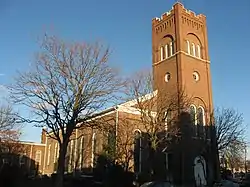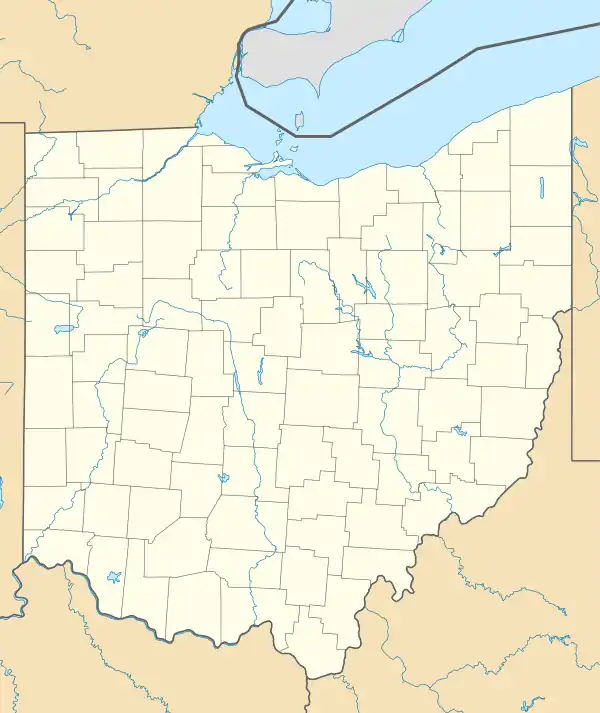First Presbyterian Church (Troy, Ohio)
First Presbyterian Church is a historic Presbyterian church building in the city of Troy, Ohio, United States. Built in the 1860s, it was the third building used by a congregation formed nearly fifty years earlier. A high-quality example of period Romanesque Revival architecture, it has been named a historic site.
First Presbyterian Church | |
 Western side and front | |
  | |
| Location | Franklin and Walnut Sts., Troy, Ohio |
|---|---|
| Coordinates | 40°2′19″N 84°12′11″W |
| Area | Less than 1 acre (0.40 ha) |
| Built | 1859 |
| Architect | George Browning Reed |
| Architectural style | Romanesque Revival |
| NRHP reference No. | 76001493[1] |
| Added to NRHP | December 12, 1976 |
Congregational history
Civilization first came to Concord Township in 1804, when the first settlers arrived,[2]:372 although Troy itself was not platted until 1807.[2]:375 The same year saw the organization of the township's first church, a New Light congregation,[2]:373 but it was 1815 before a Methodist class was formed in Troy as the city's first church.[2]:379 Presbyterian worship services began in 1818, led by missionary minister George Burgess; most services were held in the schoolhouse, although occasional services were held in the courthouse. A rude building served as the house of worship from 1826 until 1837, when the congregation divided: both sides of the Old School-New School Controversy were represented in the membership, and instead of fighting to retain the property, the two sides chose to sell the building and divide the proceeds. Although the New School congregation built a wooden church building in 1839, they commenced construction on the present building in 1859,[2]:380 and while the sanctuary was dedicated in late 1860,[3] it required four years' work for completion. At some point in 1863 or 1864, the two congregations chose to reunite, despite the remaining division between the Old and New School denominations on the national level,[2]:380 which was only resolved in 1870.[3]
Architecture
First Presbyterian Church is a brick building with stone elements, set on a stone foundation. Constructed by George R. Browning,[1] its style is the Romanesque Revival and represents some of the best pre-Civil War architecture extant in Troy. The large sanctuary is simple, typical of traditional Presbyterianism, and its design demonstrates Browning's unusually high degree of skill. The overall plan is rectangular, although a tall flat-roofed tower sits at the front of the building,[3] with an arched doorway set in its base and battlements at the top. Large arched windows, taller than the door, are placed on two levels of the tower, with an oculus between the levels on each side. Yet taller arch windows, nearly twice the height of the doors, are placed in the front (one on each side of the tower) and sides (six on each) of the building. The ends of the building rise to gables, which on the front is highlighted by a pediment behind the tower.[4]
Historic designation
In 1976, First Presbyterian Church was listed on the National Register of Historic Places, qualifying both because of its historically significant architecture and because of its place in local history. It is one of fifteen National Register-listed locations in Troy, and one of forty-four in Miami County.[1] The congregation remains active, led by Rev. Dr. Frank T. Rupnik III as pastor.[5] It is part of the Miami Valley Presbytery of the Presbyterian Church (USA).[6]
References
- "National Register Information System". National Register of Historic Places. National Park Service. July 9, 2010.
- The History of Miami County, Ohio. Chicago: Beers, 1880.
- Owen, Lorrie K., ed. Dictionary of Ohio Historic Places. Vol. 2. St. Clair Shores: Somerset, 1999, 1007.
- First Presbyterian Church, Ohio Historical Society, 2007. Accessed 2010-02-14.
- Past Ministers of FPC, First Presbyterian Church, 2012. Accessed 2014-12-31.
- Churches of the Presbytery of the Miami Valley, Miami Valley Presbytery, 2015. Accessed 2015-01-01.
External links
| Wikimedia Commons has media related to First Presbyterian Church (Troy, Ohio). |